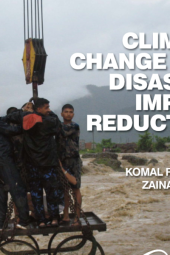Climate Change and Disaster Impact Reduction
Summary
This book is a reported volume of a UK-South Asia seminar held in Kathmandu in June 2008 that focused on young scientists and practitioners, providing a forum to share knowledge, good practice, and experiences of building pre and post-disaster planning capacity, with a specific reference to climate change.
Categories:
Book
Writer:
Komal Raj Aryal and Zaina Gadema
Publisher:
Northumbria University
Published Year:
2008
